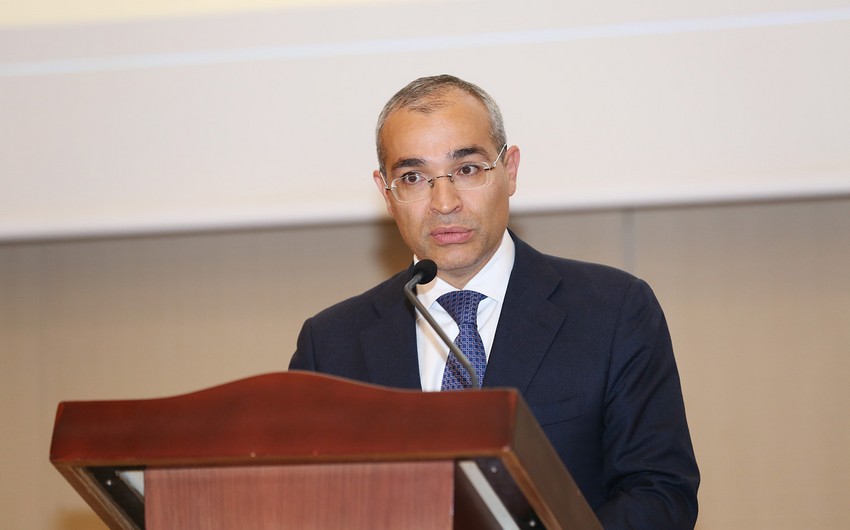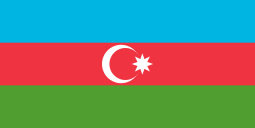
Mikayil Jabbarov: "We are concerned about inflation"
24 December 2021
"Efforts have been intensified to prevent steps that could lead to an artificial increase in consumer prices. This will be our priority in 2022," Report says, citing Azerbaijani Economy Minister Mikayil Jabbarov.
"We are concerned about issues of economic and social welfare of the population. These are inflationary processes. The inflationary processes primarily reduce the value of personal incomes," Jabbarov added.
According to him, Azerbaijan is a country integrated into the global economy: "This boils down to the fact that when inflation takes place in the global economy, of course, this is reflected in Azerbaijan, too. In 2021 the highest inflation-hit sectors are food, various constructions materials, raw materials and so on. These products, especially in Azerbaijan, are little or not produced, we depend on their imports. This is a direct transfer of price increases to the domestic market. Naturally, the government does not have so many tools to this effect. We are trying to apply a special approach to products that are of social importance, or to those who are vulnerable in terms of social protection. Over the last two years, the price of grain in world markets has increased by about 45-50%. We import a large amount of grain. The state grants subsidy to prevent the rise in prices of this strategic product.”
According to the Azerbaijani Central Bank, the average annual inflation in the country this year is expected at 6.3-6.6%, and annual inflation at 11.4-11.9%. According to the base forecast, inflation will stabilize from the first quarter of next year, and from the second half of the year, inflation will move to the upper limit of the target range.
According to official statistics, In November, the monthly inflation was 1.5%, and the 12-month inflation was 11.1%. The average annual inflation was 6.2% in January-November, and the average annual core inflation was 3.9%. The inflation rises in all product and service subgroups.
In November, the food price index rose by 1.9% compared to the previous month, and annual food inflation was 14.9%. The average annual food inflation made up 7.4% in January-November.
Prices for non-food products rose by 0.5% in November compared to the previous month, and by 7.1% over the past year. In January-November, the average annual non-food inflation stood at 4.8%.
Services rose in price by 1.6% in November and by 9.1% over the past year. The average annual service inflation was 5.4% in January-November. The effects of price liberalization, which is regulated by government regulation of service inflation, continue.
https://report.az/en/finance/mikayil-jabbarov-we-are-concerned-about-inflation/
"We are concerned about issues of economic and social welfare of the population. These are inflationary processes. The inflationary processes primarily reduce the value of personal incomes," Jabbarov added.
According to him, Azerbaijan is a country integrated into the global economy: "This boils down to the fact that when inflation takes place in the global economy, of course, this is reflected in Azerbaijan, too. In 2021 the highest inflation-hit sectors are food, various constructions materials, raw materials and so on. These products, especially in Azerbaijan, are little or not produced, we depend on their imports. This is a direct transfer of price increases to the domestic market. Naturally, the government does not have so many tools to this effect. We are trying to apply a special approach to products that are of social importance, or to those who are vulnerable in terms of social protection. Over the last two years, the price of grain in world markets has increased by about 45-50%. We import a large amount of grain. The state grants subsidy to prevent the rise in prices of this strategic product.”
According to the Azerbaijani Central Bank, the average annual inflation in the country this year is expected at 6.3-6.6%, and annual inflation at 11.4-11.9%. According to the base forecast, inflation will stabilize from the first quarter of next year, and from the second half of the year, inflation will move to the upper limit of the target range.
According to official statistics, In November, the monthly inflation was 1.5%, and the 12-month inflation was 11.1%. The average annual inflation was 6.2% in January-November, and the average annual core inflation was 3.9%. The inflation rises in all product and service subgroups.
In November, the food price index rose by 1.9% compared to the previous month, and annual food inflation was 14.9%. The average annual food inflation made up 7.4% in January-November.
Prices for non-food products rose by 0.5% in November compared to the previous month, and by 7.1% over the past year. In January-November, the average annual non-food inflation stood at 4.8%.
Services rose in price by 1.6% in November and by 9.1% over the past year. The average annual service inflation was 5.4% in January-November. The effects of price liberalization, which is regulated by government regulation of service inflation, continue.
https://report.az/en/finance/mikayil-jabbarov-we-are-concerned-about-inflation/












